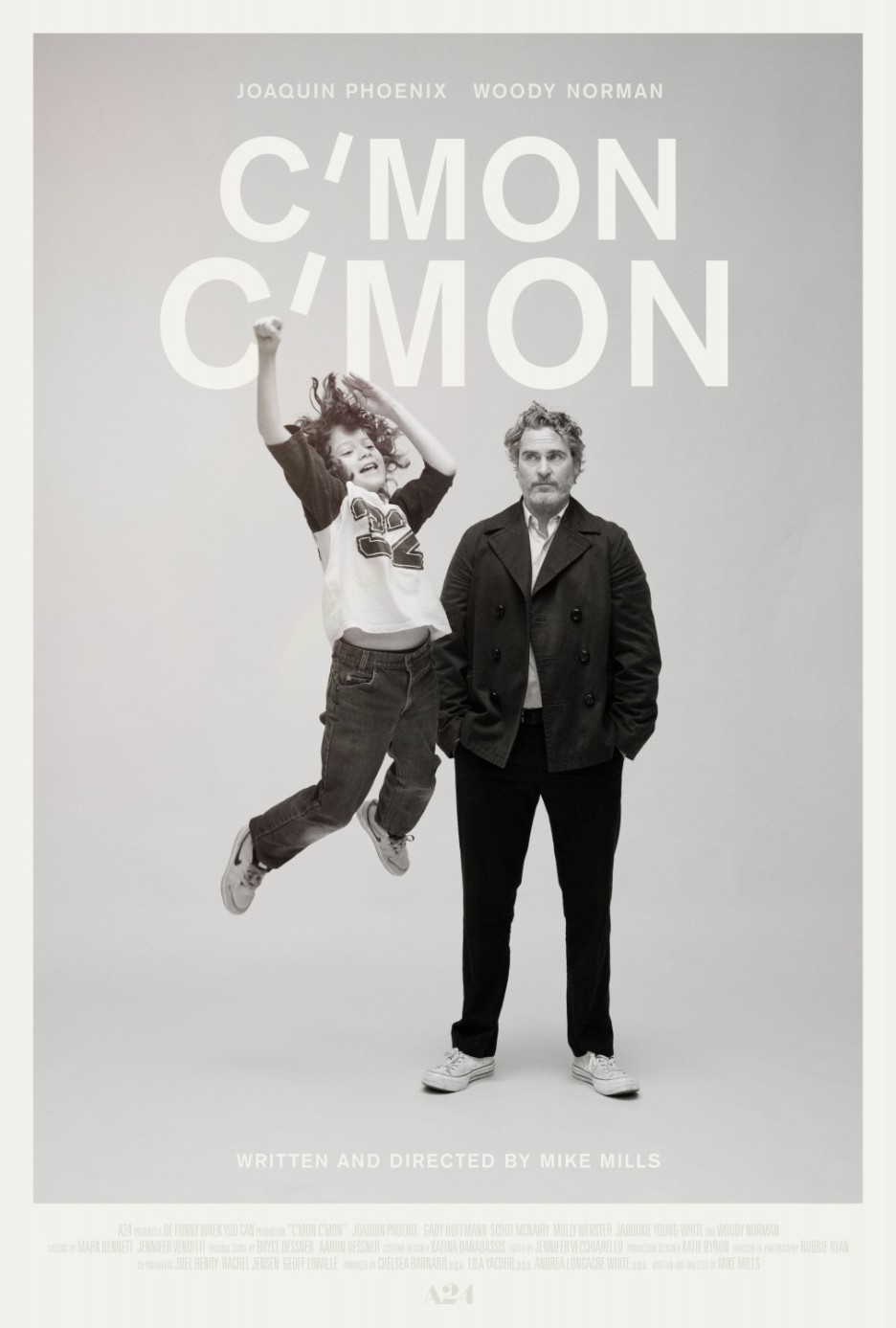Sound and Color: A24's 'C'Mon C'Mon' Staring Joaquin Phoenix Shows Us Communication is the Only Reality

There are very few things we are born knowing. When we are born we can't walk, speak, or care for ourselves. These are all things that we have to learn. As we grow through life, traveling farther and farther away from this unknowing, we forget that it ever existed. We forget there was a time we couldn't think critically or get ourselves where we needed to go: when we were fully subject to the whims of the adults in our lives. We forget that when you are an unknowing, clean, blank canvas of a person, every splash, suggestion, and thought of paint makes an impact. The mind of a child is that kind of clean canvas. Children use their senses to navigate what is to them a new world. Every word out of an adult's mouth has the power to shape the rest of a child's life for when there is nothing to contextualize a comment, it stands alone a colossus within the confines of their limited experiences. It's terrifyingly beautiful and shockingly powerful.
This impact is brilliantly explored in the new A24 film C'Mon C'Mon. Joaquin Phoenix plays Johnny, a radio journalist, who winds up taking his nephew Jesse, played by up and comer Woody Norman, across the country with him as his sister Viv, played by Gaby Hoffmann, deals with domestic troubles. Johnny tackles the intricate complexities of caring for a child head-on, consistently fearing he will do or say the wrong thing and, as is human, doing or saying the wrong thing. Jesse, and therefore the audience, feels it all: every small moment, every strange energy, every word that is said makes an impact. Through this one-on-one time with his nephew, Johnny sees firsthand the complex innocence of childhood. Through the intelligent use of sound and color, this sensationally human film allows the audience to view the world as a child, allowing what we hear and see to inform our whole world.
Silence is gently weaponized in this film in order to buttress the power of the carefully selected sound. There is nothing in this film that is extraneous; everything is meant to be heard. There is little to no music scoring the film. The music most consistently used is that of Jesse's father Paul, played by Scoot McNairy, who is a troubled musician. These sounds color memories for Jesse. They bring back times of togetherness with his family, unforgettable moments that he subconsciously uses to simplify his complex relationship with his father. Sound means something to Jesse. It means family. It means connection. Therefore, as audience members, it means something to us as well. When Johnny shares his recording equipment, headphones, and past interviews with Jesse, a connection is again made. Adults share sound. While these moments may seem mundane to an adult, they are irreplaceably meaningful to a child. Each sound shown to Jesse gives him a new piece of the world that he did not have before. It is the surest means of connection. Even when his mother is away dealing with his father, she calls to read Jesse bedtime stories. Small moments, to the ears of a child, ring loudly especially when their small world can seem very quiet.
The silence in the film also emphasizes the impact of what is directly told or explicitly not told to a child. While Viv is dealing with Paul she expressly says to Johnny, "Don't tell him." She does not want Jesse to know what is happening. While the intention behind this request is good, the realistic practicality does not follow. Jesse's world may only be constructed of what he is told, but he can sense when something is not right. He knows something is going on with his parents, but the lack of communication on the specifics of the matter leads to confusion, acting out, and misplaced emotions. Clarity comes from open communication. Shielding a child from information may be seen as a way to protect them from upsetting situations, but it only keeps them from understanding. Negative energies can be felt by all. It is the ability to use that information to draw conclusions that a child is not always equipped with. Communication is crucial. This motif persists after Johnny yells at Jesse in the store. Jesse had run away and Johnny, once he found him, yelled out of understandable worry and concern. To a young kid, however, yelling is yelling. The movie emphasizes the importance of having a clearly communicated moment of apology so that Jesse understands the moment came from love, he is loved, but should not do that again. This beautiful emphasis on communication was only possible with the expert use of silence throughout the film.

The choice to produce this movie in black and white invites the audience to see the world like a child learning it all for the first time. Jesse and Johnny travel the country together. As adults, there is an understanding that each city has its own vibrancy and importance. To a child, however, a place is a place. People are people. Importance is dictated by what is directly communicated. Even the colorful nuance of a moment is lost on a child without provided context. While Jesse is excited to visit New York and walk in a New Orleans parade, it all still happens in black and white. It is all a colorless wash that will, as Johnny points out numerous times, probably be forgotten by Jesse in time. What will not be lost is the connection between Johnny and Jesse: the connection that was made through sound. It is what we are told, not what we see that makes us who we are and informs the lives we lead. There is no connection without communication.
The suggested simplistic importance of sound and color in the film accentuates the limitless breadth of emotions Jesse feels. He senses that something is wrong with his father. He is mad at his mother. He loves his mother. He's mad at Johnny. He has fun with Johnny. He doesn't like traveling. He loves traveling. Adults often assume the feelings of a child are simple. C'Mon C'Mon gracefully shows the audience that the emotions of a child are no simpler than those of an adult. They are just as powerful, overwhelming, frustrating, and complicated. It is the tools of analysis and communication that a child lacks. When Jesse is confronted with a wave of emotion, he reacts in strange outbursts because that is all that he can think to do. When his mom mentions that she's coming home, he runs away. When Johnny tries to take him to the airport, he locks himself in a restaurant bathroom. At night he likes to play orphan, pretending his parents are dead, asking his mom about her dead children, and asking if he can stay for the night. The weird outpourings of a child's mind can seem to some like absurdism of Ubu Roi-ish extremities, but this film lets the audience see, as it guides us to see them move through Jesse's eyes, that these moments are nothing more than a desperate attempt to learn how to express the tsunami of emotions that are being held inside.

We as humans need to learn how to emote, just like we need to learn how to walk and talk. It is something we forget that we have to be taught. After Jesse runs away into the woods, Johnny follows him and tells Jesse, who insists that he is okay, that it is okay not to be okay. Johnny encourages Jesse to yell, emote, express the honesty of his feelings into the world. In a time in which the world is putting an important emphasis on mental health, this powerful scene shows that emotional awareness can be taught. It is another form of connection and communication that starts with this generation and must literally be taught to the next. If children only fully understand what they are told, the trickiest thing to untangle for them is the web of their own internal emotions. It is the job of the adult to help the child give these emotions words.
C'Mon C'Mon is a magnificent exploration of innocence, communication, and life. As we grow through time, we forget that there was a time when we knew nothing. We also forget that it is okay not to know things. Society convinces us that once we clock a certain number of years on the planet, we are no longer allowed to not have the answers. Days in and out are spent pretending to know everything. This is a ridiculous ideology. C'Mon C'Mon points out this cultural misdirection through looking back, through the eyes of a child. No one has all the answers, and that's okay. The world won't stop turning because of a human knowledge gap. When there is clear communication there will always be human connection. C'Mon C'Mon premieres in theaters on November 19th. The child in you wants to see it.
© 2025 Enstarz.com All rights reserved. Do not reproduce without permission.






